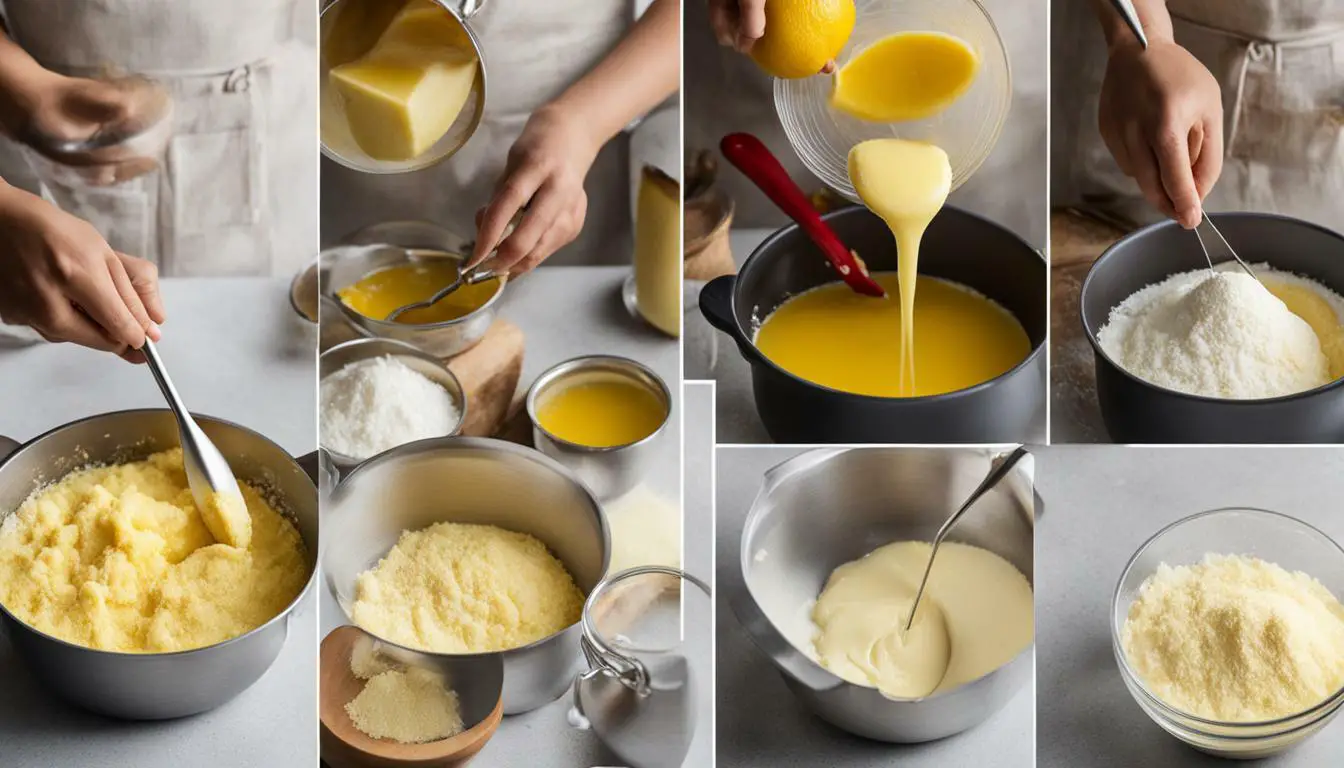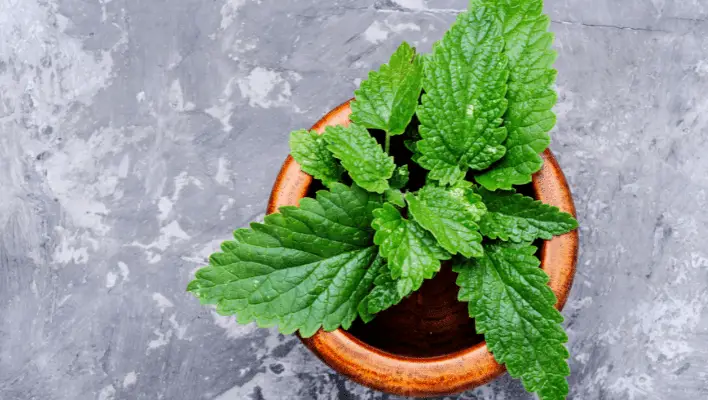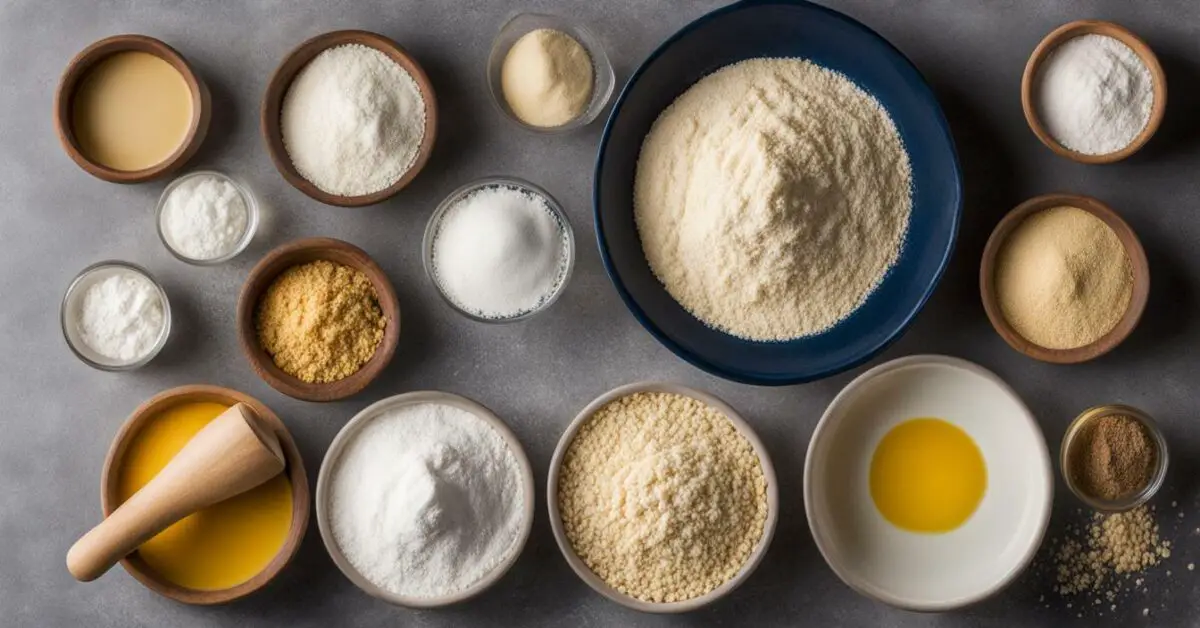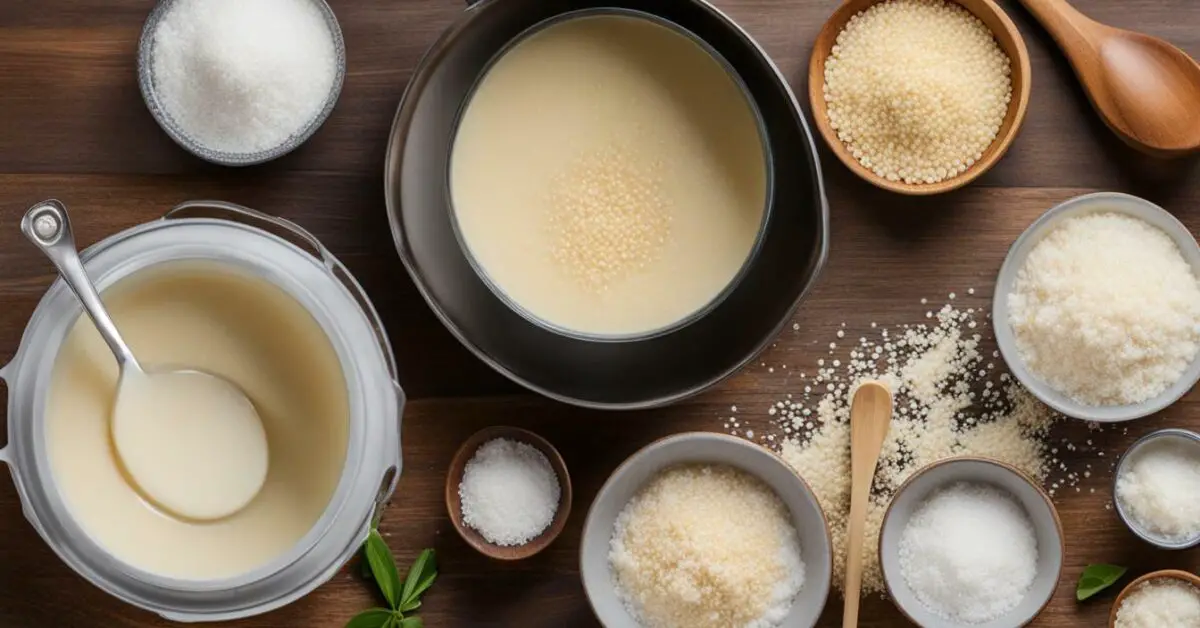
This post may contain affiliate links. Please read my disclosure for more information.
Are you in search of a suitable substitute for cornstarch in your lemon curd recipe? Look no further! We have compiled a list of the top 5 alternatives that will ensure your lemon curd turns out just as delicious.
Key Takeaways:
- All-purpose flour can be used as a substitute for cornstarch in lemon curd, with a recommended ratio of 2:1.
- Rice flour, which has a similar consistency to wheat flour, can be used as a substitute in the same ratio as all-purpose flour.
- Almond flour is a gluten-free alternative that can be used in a 1:1 ratio, just like all-purpose flour.
- Arrowroot powder is an alternative that works well as a thickening agent, with a ratio of 2:1.
- Potato starch, tapioca, and cassava flour are also gluten-free options that can be used in a 1:1 ratio as substitutes.
If you’re looking for natural thickeners, consider trying pureed vegetables like tomatoes or crushed walnuts. Additionally, simmering your lemon curd for a longer period of time can help naturally thicken the mixture.
All-Purpose Flour as a Substitute for Cornstarch
One of the most accessible alternatives to cornstarch in lemon curd is all-purpose flour, a versatile ingredient found in most kitchens. Using all-purpose flour as a substitute can provide a similar thickening effect to cornstarch. To achieve the desired consistency, you would use a ratio of 2 parts all-purpose flour to 1 part cornstarch in your recipe.
All-purpose flour is known for its ability to thicken sauces, soups, and custards. It blends easily and adds a subtle taste that complements the tanginess of lemon curd. When using all-purpose flour as a substitute, it’s essential to mix it thoroughly with the other ingredients to prevent clumping and ensure even distribution.
By incorporating all-purpose flour as a cornstarch alternative, you can create a smooth and luscious lemon curd without compromising on taste or texture. It’s a reliable option that can be easily adjusted to suit your preferences. Just remember to whisk or stir the mixture well during the cooking process to achieve a consistent and creamy result.
Table: All-Purpose Flour as a Substitute
| Ingredient | Substitution Ratio |
|---|---|
| All-Purpose Flour | 2 parts |
| Cornstarch | 1 part |
Rice Flour as a Substitute for Cornstarch
If you prefer a gluten-free option, rice flour can be an excellent substitute for cornstarch in your lemon curd recipe. Rice flour has a similar consistency to wheat flour, making it a suitable alternative. To use rice flour as a substitute, you would follow the same ratio as you would with all-purpose flour, which is a 2:1 ratio of flour to cornstarch.
Rice flour provides a smooth texture and helps thicken the lemon curd just like cornstarch does. It is important to note that rice flour may result in a slightly different taste and texture compared to cornstarch, so it’s a good idea to experiment and adjust the recipe to suit your preferences.
When substituting cornstarch with rice flour in your lemon curd recipe, you can expect a gluten-free option that still delivers a creamy and satisfying texture. Rice flour is a versatile ingredient that can be used in various baking and cooking recipes, making it a valuable alternative for those with dietary restrictions or preferences.
| Substitute | Ratio to Cornstarch |
|---|---|
| Rice Flour | 2:1 |
| All-Purpose Flour | 2:1 |
| Almond Flour | 1:1 |
| Arrowroot Powder | 2:1 |
| Potato Starch | 1:1 |
| Tapioca | 1:1 |
| Cassava Flour | 1:1 |
By exploring alternatives like rice flour, you can customize your lemon curd to suit your dietary needs and preferences. Whether you’re looking for a gluten-free option or simply want to try something new, these substitutes offer a range of possibilities for creating a delicious and satisfying lemon curd without cornstarch.
Almond Flour as a Substitute for Cornstarch
Looking for a gluten-free alternative with a nutty flavor? Almond flour can be the perfect substitute for cornstarch in your lemon curd recipe. This versatile option not only adds a unique taste to your dish but also provides a great texture.
When substituting cornstarch with almond flour, the recommended ratio is a 1:1 replacement. This means that for every tablespoon of cornstarch called for in your recipe, you would use an equal amount of almond flour. This ratio ensures a suitable thickening effect without compromising the taste or consistency of your lemon curd.
Almond flour, derived from finely ground almonds, is a great option for those following a gluten-free diet. It contains healthy fats, fiber, and protein, making it a nutritious choice. Additionally, almond flour adds a delightful nutty flavor that complements the tanginess of the lemon curd.
| Substitute | Ratio to Cornstarch |
|---|---|
| Almond Flour | 1:1 |
So, if you’re looking to make your lemon curd gluten-free and add a touch of nuttiness, consider using almond flour as a substitute for cornstarch. It’s an excellent choice that brings a unique flavor and texture to your culinary creations.
Other Gluten-Free Substitutes for Cornstarch
For those following a gluten-free diet and looking for more options, arrowroot powder, potato starch, tapioca, and cassava flour can be excellent substitutes for cornstarch in your lemon curd recipe. Each of these alternatives provides a unique texture and flavor profile, allowing you to customize your lemon curd based on personal preferences.
- Arrowroot powder: This gluten-free powder is derived from the tropical arrowroot plant. It has a neutral taste and provides a glossy finish to your lemon curd. You can replace cornstarch with arrowroot powder at a 2:1 ratio, using two tablespoons of arrowroot powder for every one tablespoon of cornstarch.
- Potato starch: Made from finely ground potatoes, potato starch is a versatile gluten-free thickening agent. It adds a subtle earthy flavor to your lemon curd. To substitute cornstarch with potato starch, use a 1:1 ratio, replacing one tablespoon of cornstarch with one tablespoon of potato starch.
- Tapioca: Tapioca pearls or flour, derived from the cassava root, can be used to thicken your lemon curd. Tapioca lends a chewy texture to your curd and works best when used with other thickeners. Substitute cornstarch with tapioca at a 1:1 ratio, using equal amounts of both.
- Cassava flour: Cassava flour, another product derived from the cassava root, is known for its starchy texture. It adds a slightly sweet and nutty flavor to your lemon curd. Replace cornstarch with cassava flour at a 1:1 ratio, using one tablespoon of cassava flour for every one tablespoon of cornstarch.
If you’re unsure about the best substitute for your lemon curd, feel free to experiment with different combinations and ratios until you achieve the desired consistency and taste. Remember to adjust the amount of substitute based on the original cornstarch measurement in your recipe.
| Substitute | Ratio | Flavor Profile | Recommended Use |
|---|---|---|---|
| Arrowroot powder | 2:1 (2 tbsp arrowroot powder for 1 tbsp cornstarch) | Neutral | Glossy finish |
| Potato starch | 1:1 (1 tbsp potato starch for 1 tbsp cornstarch) | Earthy | Versatile thickener |
| Tapioca | 1:1 (equal amounts of tapioca and cornstarch) | Chewy | Works well with other thickeners |
| Cassava flour | 1:1 (1 tbsp cassava flour for 1 tbsp cornstarch) | Slightly sweet and nutty | Starchy texture |
By exploring these gluten-free substitutes for cornstarch in your lemon curd, you can create a delicious and tailored dessert while accommodating dietary restrictions or preferences. Don’t be afraid to get creative in the kitchen and find the perfect substitute that suits your taste.
Natural Thickeners and Simmering Technique
If you prefer natural options to thicken your lemon curd without cornstarch, consider using pureed vegetables and employing a simmering technique for a delectable result. Pureed vegetables, such as tomatoes or crushed walnuts, can add a velvety texture to your lemon curd while providing a subtle flavor enhancement. Simply blend the vegetables of your choice until smooth and incorporate them into the curd during the cooking process. This method allows you to achieve a thicker consistency without relying on artificial thickeners.
In addition to pureed vegetables, simmering your lemon curd for a longer period of time can naturally thicken the mixture. As the curd simmers, the liquid evaporates, leaving behind a more concentrated and thickened texture. This process intensifies the flavor of the lemon curd and enhances its overall richness. Be sure to stir the curd regularly to prevent it from sticking to the pan or forming a skin on the surface.
By using pureed vegetables and simmering your lemon curd, you can create a luscious, cornstarch-free alternative that bursts with natural flavors and textures. Experiment with different vegetables and cooking times to find the perfect balance for your taste preferences. Enjoy the versatility of these natural thickeners and the unique depth they add to your lemon curd.
| Natural Thickeners | Simmering Technique |
|---|---|
| – Pureed vegetables (e.g., tomatoes, crushed walnuts) | – Increase cooking time to evaporate liquid |
| – Experiment with different vegetables | – Stir regularly to prevent sticking |
| – Enhances flavor and texture | – Develops a more concentrated and thickened consistency |
In Conclusion
By exploring the various alternatives to cornstarch in lemon curd, you can find the perfect substitute that suits your dietary needs and preferences, allowing you to create delightful lemon curd without compromising on taste and texture.
If you prefer a more traditional approach, all-purpose flour is a reliable substitute, with a recommended ratio of 2 parts flour to 1 part cornstarch. This option provides a similar thickening effect and can be easily incorporated into your recipes.
For those looking for gluten-free alternatives, both rice flour and almond flour can be used in place of cornstarch. The recommended ratio for rice flour and almond flour is 1:1, making it convenient to substitute without any significant adjustments to your recipe.
Other gluten-free options like arrowroot powder, potato starch, tapioca, and cassava flour are also viable substitutes. With a 1:1 ratio of substitute to cornstarch, these alternatives offer versatility while maintaining the desired thickness in your lemon curd.
If you’re seeking natural thickeners, consider pureed vegetables such as tomatoes or crushed walnuts. These ingredients can add a unique flavor profile and texture to your lemon curd while avoiding the use of starches or flours.
Alternatively, a simple change to your cooking technique can achieve a thicker consistency without the need for a thickening agent. By simmering your lemon curd for a longer period of time, you allow the mixture to naturally reduce and thicken, resulting in a luscious and velvety texture.
With these alternatives and techniques at your disposal, you have the flexibility to create delicious, cornstarch-free lemon curd that caters to your dietary preferences and restrictions. Experiment with different options and ratios to find the perfect substitution that suits your taste and dietary needs, and enjoy the wonderful world of lemon curd without the reliance on cornstarch.
FAQ
What are some alternatives to cornstarch in lemon curd?
Some alternatives to cornstarch in lemon curd include all-purpose flour, rice flour, almond flour, arrowroot powder, potato starch, tapioca, cassava flour, ground flaxseeds, psyllium husk, sorghum flour, xanthan gum, guar gum, glucomannan powder, pureed vegetables, and the technique of simmering for a longer duration.
How do I substitute all-purpose flour for cornstarch in lemon curd?
To substitute all-purpose flour for cornstarch in lemon curd, use a 2:1 ratio of flour to cornstarch in your recipe.
Can I use rice flour as a substitute for cornstarch in lemon curd?
Yes, rice flour can be used as a substitute for cornstarch in lemon curd. Use the same ratio of rice flour to cornstarch as you would with all-purpose flour.
Is almond flour a suitable substitute for cornstarch in lemon curd?
Yes, almond flour can be used as a gluten-free substitute for cornstarch in lemon curd. Use a 1:1 ratio of almond flour to cornstarch.
What are some other gluten-free substitutes for cornstarch in lemon curd?
Other gluten-free substitutes for cornstarch in lemon curd include arrowroot powder, potato starch, tapioca, and cassava flour. Use a 1:1 ratio of the substitute to cornstarch for each option.
Can natural thickeners be used in place of cornstarch in lemon curd?
Yes, natural thickeners like pureed vegetables, such as tomatoes, or crushed walnuts can be used to thicken lemon curd without cornstarch. Additionally, simmering the mixture for a longer duration can naturally thicken the consistency.


